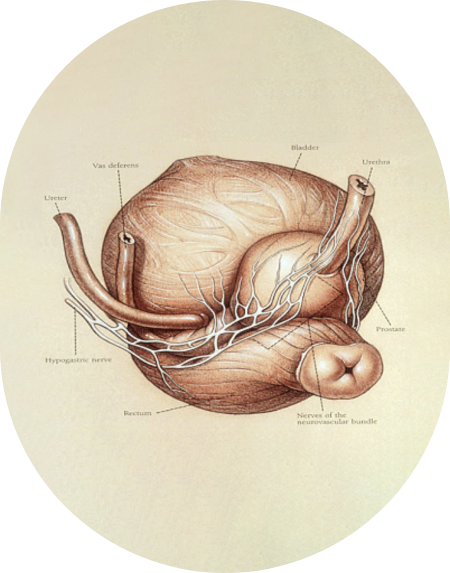PROSTATE SURGERY
Prostate Cancer Nerve Sparing Surgery
In a study of 500 men operated on by Professor Eden, 86% remained potent after surgery – one of the highest rates in the field. At Santis, we are able to offer it to 90% of our patients.
Not all surgeons can perform nerve sparing prostatectomy successfully. It requires a highly-skilled and experienced surgeon to delicately remove the prostate using a robotic arm, while preserving the local bundles of nerves that control erections. If successful, then patients can look forward to resuming their sex life as usual within twelve months of surgery. For more information, see our article ‘Can a man have a normal sex life after prostate surgery?’
What does nerve sparing prostate surgery involve?
Nerve sparing surgery is a specialised procedure for cancer that has not spread outside the prostate gland. This surgery aims to carefully preserve the local nerve bundles responsible for erectile function, while effectively removing the cancerous tissue.
During the operation, the surgeon skilfully separates the prostate from the nerves without causing harm. However, if the cancer is located near or within the nerve bundles, it may be necessary to remove them to ensure complete cancer removal. Discussing your specific situation and options with your surgeon beforehand is essential.

How is the surgery performed?
Prostate cancer nerve sparing surgery can be performed in various ways – traditional “open” surgery, laparoscopic surgery, or robotic nerve sparing prostatectomy.
Open surgery requires a larger incision to access the prostate directly, from below the navel to the pubic bone. The surgeon carefully removes the tumour while avoiding critical nerve structures.
Laparoscopic surgery offers a minimally invasive alternative, using tiny incisions and advanced instruments and cameras to complete the operation.
Robotic-assisted nerve sparing surgery utilises robotic tools controlled by the surgeon through a computer, enhancing precision and visibility during the procedure.

What influences success in nerve sparing prostatectomy?
Results of a nerve sparing prostatectomy depend on the stage of the prostate cancer, and on the age of the patient. If the cancer is advanced, then it may not be possible to save the nerves as they may contain cancerous cells as well. However, your overall chances of saving your nerve bundle, and consequently avoiding impotence, are greatly maximised with a surgeon whose results speak for themselves.

Benefits:
Preservation of erectile function:
carefully avoids or preserves the nerve bundles that control erections.
Improved quality of life:
enhanced outcomes relating to sexual function and continence.
Reduced risk of incontinence:
maintains the integrity of nerves that control bladder function.
Minimised side effects:
smaller incisions, reduced pain, and faster recovery, with nerve function preservation.
Targeted cancer removal:
removes cancerous prostate tissue while minimising damage to surrounding structures.
Limitations:
Erectile dysfunction:
some patients may still experience partial or complete erectile dysfunction, particularly if the nerves are damaged during surgery.
Urinary incontinence:
there is a risk of urinary incontinence post- surgery, although this may improve over time with recovery.
Surgical complications:
as with any surgery, nerve sparing procedures carry risks such as bleeding, infection, and complications from anaesthesia.
Prolonged recovery:
if complications occur or nerve preservation is only partially successful, recovery may take longer and may require extended rehabilitation for sexual or urinary functions.
Frequently Asked Questions:
What is nerve sparing prostatectomy?
A nerve sparing prostatectomy is a surgical procedure used to treat localised prostate cancer. The goal is to carefully remove the prostate gland while preserving the nerve bundles that control erectile function.
What is non-nerve sparing prostatectomy?
A non-nerve sparing prostatectomy involves the removal of the prostate gland along with the surrounding nerve bundles. This is typically chosen when the cancer has spread to or is located very close to the nerves, making preservation impossible without risking incomplete cancer removal.
Who is a candidate for nerve sparing prostatectomy?
Nerve sparing prostatectomy is typically suitable for patients who have localised prostate cancer that hasn’t spread outside the prostate gland or invaded the surrounding nerves. Factors depend on the cancer’s stage, location, and the patient’s overall health. A detailed consultation with a surgeon is essential to determine whether nerve sparing surgery is a viable option.
How much nerve sparing can be done using robotic prostatectomy?
Robotic nerve sparing prostatectomy offers enhanced precision, allowing surgeons to perform complete or partial nerve sparing. The extent of nerve sparing depends on the cancer’s proximity to the nerve bundles. If the cancer is distant, complete preservation is often possible. However, if the cancer is close, partial or no nerve sparing may be required to ensure all cancer is removed.







